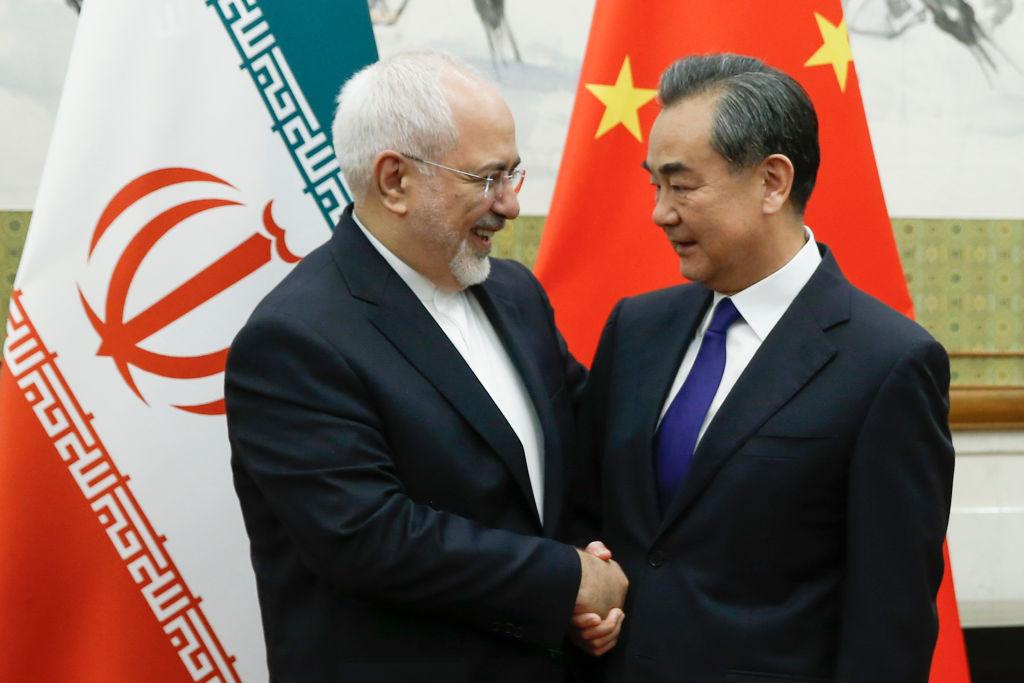
Iran is considering an offer from Beijing to revive an agreement which, combined with an enhanced security and military relationship, could give China a new strategic foothold in the Middle East.
In early July, Iranian Foreign Minister Javad Zarif told Iranian MPs that an Iran–China 25-year strategic cooperation agreement was ‘under consideration’. This is not a new initiative but the renewal and update of a ‘comprehensive strategic partnership’ document signed by Iranian President Hassan Rouhani and Chinese Premier Xi Jinping in Tehran in January 2016.
Few details about the 2016 partnership and the 17 accords which Xi also signed then were ever disclosed. Reportedly, the document was a roadmap for upgrading the bilateral relationship and involved some US$600 billion in two-way trade and investment over the following 10 years. Iranian exports to China were identified as primarily oil, gas and other petrochemical products. China is Iran’s major trading partner and oil is Iran’s primary export to China. Chinese investment in Iran would focus on energy, manufacturing and transportation with road, rail and port projects linked to China’s Belt and Road Initiative (BRI).
The implementation of the partnership and related investment was dependent on the lifting of global sanctions against Iran and was timed to occur shortly after the Joint Comprehensive Plan of Action (JCPOA) took effect on 16 January 2016.
China appears to have put much of the 2016 agreement on hold after signing. Its principal reason would have been the need to work through the complexities of its relationship with the US, especially after Donald Trump’s election as president and given his hostility to the JCPOA. That became even more complex after the withdrawal of the US from the agreement in May 2018 and its imposition of unilateral sanctions.
Zarif has so far disclosed little detail about the renewed agreement. From information available so far, in addition to trade and investment, it also includes security, military and intelligence cooperation. Two-way trade and investment is valued at US$400 billion, with China investing some US$280 billion in Iran’s energy sector and US$120 billion in transport, telecommunications and manufacturing. A major mutual benefit is China’s guarantee to buy Iranian oil for 25 years, reportedly at a discount price, and Iran’s guarantee to supply it—assuming there’s sufficient long-term stability in the Middle East to allow that to happen.
For Iran, the renewed partnership would provide a significant and desperately needed economic lifeline that it would hope would circumvent crippling US sanctions. Bilateral offset financial arrangements would enable the trading of Iran’s major export resource, oil, without involving the international banking and financial system. Iran’s economy would also benefit significantly from upgraded and new industries, and the jobs they’d create.
For China, the multiple benefits would include the long-term guaranteed supply of oil at a discounted price, the use of Iran as a hub to progress the BRI land transportation corridor between Western China and Turkey, and marketing and manufacturing opportunities for Chinese goods. That would happen, in many cases, at the expense of the Europeans, who are severely constrained or intimidated by the US sanctions. This would demonstrate that, despite its tensions with the US, China is still able both to successfully pursue its geopolitical and economic interests and to secure this new strategic foothold.
The timing of Zarif’s announcement, presumably agreed to by the Chinese, was undoubtedly calculated to rattle the US cage, and especially to unsettle Trump this close to the November presidential elections. One major message from Iran is that it can survive, despite Trump’s ‘maximum pressure’ campaign to force regime change.
Responding to Zarif’s announcement, US Secretary of State Mike Pompeo said in an interview on 2 August that China’s action would ‘destabilise the Middle East’. He said arms and money from China would enable Iran to continue as ‘the world’s largest state sponsor of terror’ and, particularly, to put Israel, Saudi Arabia and the United Arab Emirates at risk. These three countries were singled out because of their growing relationships with China, and the pressure they could put on China to limit the scope of its agreement with Iran.
China and Iran may hasten slowly to implement the agreement. Both are likely to hold back on many detailed aspects until the outcome of the US presidential election is known. Critical considerations for Iran will be whether the US rejoins the JCPOA, and, if so, under what conditions, and whether US sanctions will be lifted.
Iran also will reject any aspect of an agreement with China that suggests any ceding of sovereignty of land or major national resources, or any potential debt trap, as has occurred with other countries. Strict boundaries of sovereignty are enshrined in Iran’s constitution. Iran also will insist that any new infrastructure projects employ Iranian labour and are not, as occurs elsewhere, outsourced to imported Chinese labour.
China’s political, economic and strategic interests in the Middle East are very much regional, and Beijing will be careful not to alienate others and prejudice its broader interests through its dealings with Iran. It will heed representations by Saudi Arabia, the UAE, other Gulf states and Israel, and seek to strike an acceptable balance of respective interests.
On 6 August, Al Jazeera cited Indian media reports that India’s relationship with Iran may be a casualty of the renewed agreement with China. The report claimed that Iran had dropped plans for India to build a railway line between the port city of Chabahar and Zahedan, near the Afghan border. When completed, the project would have provided India with a trade route to Afghanistan and Central Asia. It would also have competed with China’s proposed trade to these countries along BRI-upgraded routes through Pakistan.
Pending clarification of the Indian reports, it seems unlikely that Iran would sacrifice its longstanding relationship with India. As for China, it will seek to balance its interests.